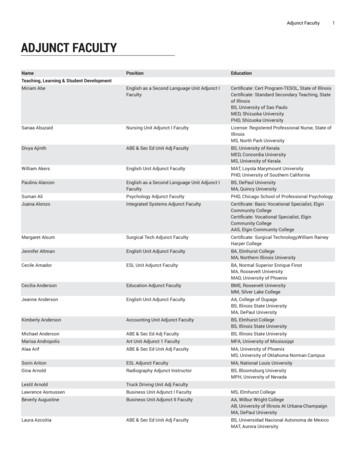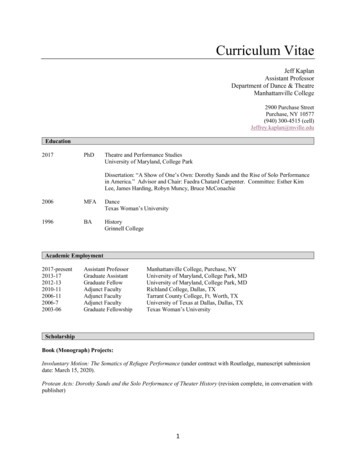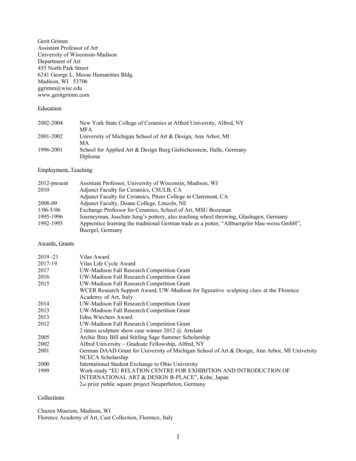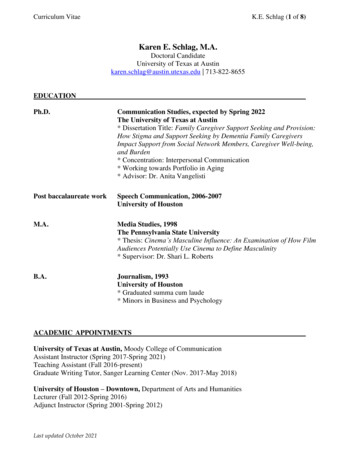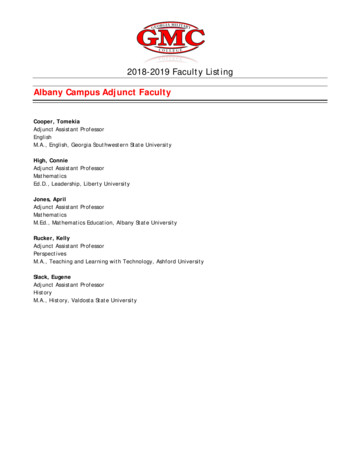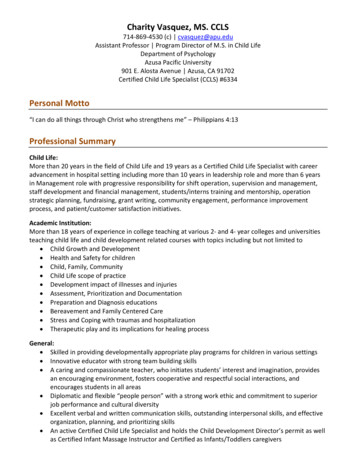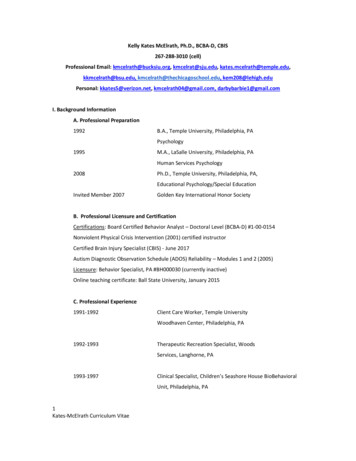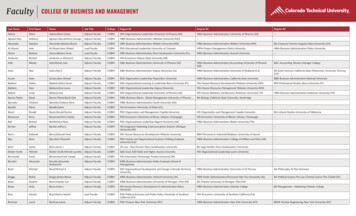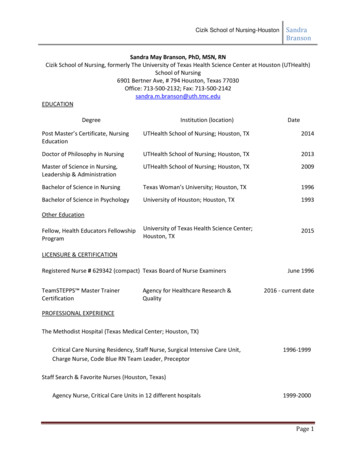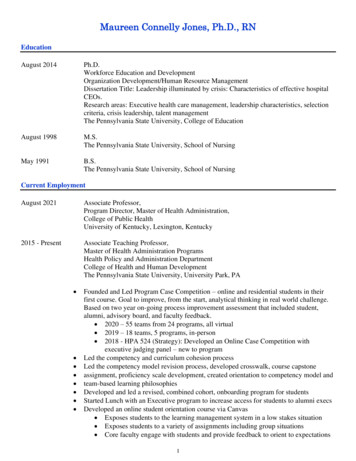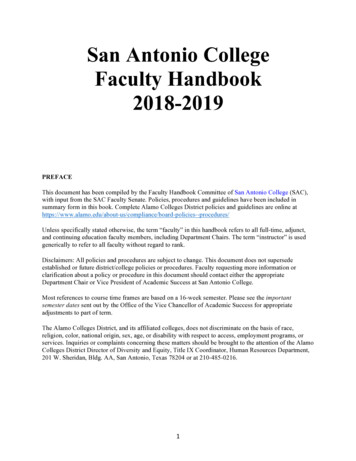
Transcription
2017-2018ADJUNCT FACULTYHANDBOOKAzusa Pacific UniversityP.O. Box 7000901 East Alosta AvenueAzusa, California 91702-7000apu.eduOffice of the ProvostOffice of Human ResourcesRevised: September 2017This handbook is the property of Azusa Pacific Universityand is intended for use by the university's adjunct faculty members.
Dear Adjunct Faculty Member,Welcome! We are pleased that you are a part of the Azusa Pacific University community.Your important contribution adds to the depth and breadth of our instructional offering.We are committed to making you feel an essential part of our community.This Adjunct Faculty Handbook is intended to provide you with some vital information aboutAPU’s mission and values along with services available to you and your students, and importantAPU policies and procedures. Additional material will be provided through departments andorientation sessions on campus.Adjunct faculty are expected to read and comply with all policies and procedures outlined in thehandbook. We hope that this will be useful and helpful to you.We pray that your experience with Azusa Pacific University is a positive one, and appreciateyour contribution to our community. Any questions about the content in this handbook or otherissues can be directed to your department chair, program director, or to the Office of HumanResources at employment@apu.edu or (626) 815-4526.Sincerely,Mark Stanton, PhD, ABPPProvostTOWARD EXCELLENCE IN TEACHING“Institutions, large and small, old and young, famous and unknown, have a quality asinstitutions which have a profound influence on all who participate in their processes. Under thebest conditions, all who are a part of the institution and especially, the faculty strive to create theatmosphere in which the process of higher learning can flourish a tolerant, kindly, persistent,exciting, and exacting search for truth. To become a part of such a living community of learners,as teacher and student is to take part in the fullest realization of one’s potential. No collegeteacher will achieve his optimum power that is not strengthened, supported, and inspired by anawareness of and, perhaps, humble pride in his institution as a whole.”Earl V. Pullias and Aileene Lockhart,Toward Excellence in College Teaching (pp. 24-25).iAzusa Pacific University2017-18 Adjunct Faculty HandbookRevised September 2017
TABLE OF Purpose of the Adjunct Faculty HandbookThe University’s Christian Worldview Statement of Faith Mission Statement Essence Statement Cornerstones MottoPage11223357Academic Administration (Adapted from 2017-18 Faculty HandbookSection 2 Administrative and Academic Organization) The Role of the Provost The Role of the Academic Cabinet83.0Academic Structure of Colleges/Schools(Adapted from 2017-18 Faculty Handbook Section 2.2 Structure ofSchools and Colleges)94.0Adjunct Faculty Member Duties and Responsibilities Definition Appointment Faculty Expectations and Responsibilities (Adapted from the2017-18 Faculty Handbook Section 2 Faculty Member Duties &Responsibilitieso Expectationso Mutual Respect and Collegialityo Spiritual Lifeo Faculty Absences/Canceling Classo Office Hours Assessment of Teaching Effectiveness (Adapted from the 201718 Faculty Handbook Section 7.2 Assessment of Faculty Rolesin FES/Teaching Effectiveness)o IDEA System for Assessing Teaching Effectivenesso Administering IDEA Evaluationso Adjunct Faculty Participation in Program Assessment Relationships with Students (Adapted from the 2017-18 FacultyHandbook Section 5 Faculty Expectations & Responsibilities)o Interactions with Studentso Interactions with Student Athletes Employee Relationso Respect and Esteem Trainingo FERPA Trainingo Confidential Information (Employee Handbook 1717iiAzusa Pacific University2017-18 Adjunct Faculty HandbookRevised September 2017
Section4.0oooooo5.06.07.0DescriptionHarassment Based on Discrimination(Employee Handbook Section 8.12)Sexual Harassment (Employee Handbook Section 8.13)Title IXChild Abuse Prevention and Reporting PolicyConflict of Interest (Employee Handbook Section 8.10)Work Apparel (Employee Handbook Section 8.14)Page171820202121Contracts, Workload, Salary Scale, Payroll, and Benefits Adjunct Faculty Contract Adjunct Teaching Loads and Workload Maximums Non-Exempt APU Staff Members as Adjunct Faculty Adjunct/Overload Salary Scale for FY 2017-18 (2017-18 FacultyHandbook Section 3.9) Paychecks Benefits (Employee Handbook Sections 5-6)o Sick Leaveo Bereavemento Leave of Absenceo Medical & Dentalo RetirementInstructional Policies (Adapted from the 2017-18 Faculty HandbookSection 5.1) Syllabus Standard Syllabus Language for Credit Hour Assignment Academic Service-Learning Copyright Policy Early, Late or Make-up Exams Undergraduate Finals Grading, Incomplete and Grade Change Learning Enrichment Center Textbooks Academic Freedom Academic Integrity2222222324Campus Resources for Adjunct Faculty The Center for Teaching, Learning, and Assessment (CTLA) Faith Integration ITT Teaching and Technology Resources Departmental Support Duplicating Office Supplies Textbook Requests Personal Information Parking 030303132343537iiiAzusa Pacific University2017-18 Adjunct Faculty HandbookRevised September 2017
Section7.0 8.0DescriptionIdentification Cards (Employee Handbook Section 8.15)University KeysExpense ReportsTransportation for Off-Campus ActivitiesThe University BookstoreMeals / Food Services on Azusa CampusesMinistry ResourcesDepartment of Campus SafetyCenter for Career and CallingUniversity Counseling CenterInformation & Media Technology (IMT)o Equipment/Set-up Requests for Classroomso APU Network Accountso Network Services and Internet Acceptable Use PolicyThe Computer StoreVirtual Library Services/Resources OverviewMail Services (Azusa campuses only)University Cashiering Services (Azusa campuses only)Safety and Security (Employee Handbook Section 9.0) General Emergency Procedures Emergency Illness / Injury on Campus(Employee Handbook Section 9.2) Other Emergencies (Employee Handbook Section 9.3) Violence Prevention (Employee Handbook Section 9.4) Illicit Substances, Alcohol and Smoking(Employee Handbook Section 9.5) Inspections of Employees and Property(Employee Handbook Section 48484950ivAzusa Pacific University2017-18 Adjunct Faculty HandbookRevised September 2017
1.0 INTRODUCTION(Adapted from 2017-18 Faculty Handbook Section 1 Purpose of the Handbook)1.1 Purpose of the Adjunct Faculty HandbookRevised: August 2017This handbook is designed as a guide for adjunct faculty and their department chairs andprogram directors, providing information which is essential to a better understanding of the roleof an adjunct faculty member at Azusa Pacific University. This publication is intended for use inadjunct faculty orientation as well as to serve as a ready reference for institutional life andprocedure, clarifying adjunct faculty responsibilities and privileges.This handbook is not the sole document for adjunct faculty guidance. The Faculty Handbook,Employee Handbook, the University catalogs, the What We Believe booklet, and other officialdocuments as they are issued, serve as a collective body of information to which adjunct facultyand administration look for information relative to institutional policy, procedure, and guidelines.This handbook and the information it contains are subject to review and/or revision by theadministration or the Board of Trustees.Web links are provided where available in hopes of providing direct access to the source ofinformation and policies referenced herein. Adjunct faculty have access to these resourcesthrough their APU network accounts/APU Net ID#.Adjunct faculty members who have questions regarding this handbook are encouraged toconsult with their department chair, program director, or department mentor, or the Office ofHuman Resources at employment@apu.edu and (626) 815-4526.Return to TOC1Azusa Pacific University2017-18 Adjunct Faculty HandbookRevised September 2017
1.2 The University’s Christian Worldview(apu.edu/about/believe/; .apu.edu/humanresources/handbook/)The essential components of the university’s identity are found in several sources, including atthe links listed above as well as in university catalogs and other publications. This sectionexplains the role of each of those sources.The Statement of Faith, Mission Statement, Essence Statement, Cornerstones, and the Motto ofAzusa Pacific University provide a solid foundation on which to build positional statements of theinstitution as an evangelical Christian university. These documents evidence a strong Christiancommitment and form the core of the increasingly far-reaching nature and scope of the APUcommunity. They give expression to a strong, clear, unswervingly evangelical Christianworldview that permeates the university and guides its activity. As its guiding center, theuniversity is able to grow more effectively in the confidence that its Christian nature will flourish.The documents that have been part of the growing history of APU serve as a cohesive core.Each evolves from the other, providing consistency and natural coordination that demonstratesthe university’s worldview as thoroughly Christian.The Statement of Faith is the central statement of the university in matters of identity andnature. It provides an evangelical Christian declaration of the theological underpinnings onwhich the university is built. It contains a clear description of faith and living as a reflection of theinstitution’s heritage of integration of right belief and right living.Statement of Faith We believe the Bible to be the inspired, the only infallible, authoritativeword of God. We believe that there is one God, creator of heaven and earth, eternallyexistent in three persons — Father, Son, and Holy Spirit. We believe in the deity of our Lord Jesus Christ, in His virgin birth, in Hissinless life, in His miracles, in His vicarious and atoning death through Hisshed blood, in His bodily resurrection, and in His ascension to the righthand of the Father, and in His personal return to power and glory. We believe in the fall and consequent total moral depravity of humanity,resulting in our exceeding sinfulness and lost estate, and necessitatingour regeneration by the Holy Spirit. We believe in the present and continuing ministry of sanctification by theHoly Spirit by whose infilling the believing Christian is cleansed andempowered for a life of holiness and service. We believe in the resurrection of both the saved and the lost; those whoare saved to the resurrection of life and those who are lost to theresurrection of damnation. We believe in the spiritual unity of believers in our Lord Jesus Christ.Return to TOC2Azusa Pacific University2017-18 Adjunct Faculty HandbookRevised September 2017
The Mission Statement provides the direction and task to which the university applies itsresources and effort, with the understanding that the integrative nature of faith cannot be fulfilledapart from a mission of transformation consistent with a Christian commitment.Mission Statement:Azusa Pacific University is an evangelical Christian community ofdisciples and scholars who seek to advance the work of God in the worldthrough academic excellence in liberal arts and professional programs ofhigher education that encourage students to develop a Christianperspective of truth and life.The Essence Statement describes the nature of the university in living out core values in thepursuit of its mission.Essence Statement:The essence statement of Azusa Pacific University is a philosophical descriptionof the institution and its people--students, staff, faculty, trustees, administration,and alumni--who we are and who we are becoming. We are an institution ofhigher education with a tradition of Wesleyan evangelical Christianity. Whileacknowledging that as individuals we are at different points along the way, weare all nevertheless journeying toward the ideals described in the fourperspectives that follow: Christian, Academic, Developmental, and Service.CHRISTIAN:We are Christians who Believe that God is the origin of all things and the source of values madeknown to us in His creation, in human experience, and finally and fully inJesus Christ.Hold the Bible as the Word of God, the basis of our faith, and the primaryrecord by which these values are made known.Rely on the Holy Spirit to help us discover these values, to understandthem, and to live a life consistent with them.Live as citizens of the kingdom of God, who model its values and therebycall into question the values of the world.Confess Jesus Christ as Lord of our lives, our university, and our worldand as the final authority for our faith and life.Recognize that redemption by Jesus Christ and personal acceptance ofHis forgiveness are necessary for human wholeness.Return to TOC3Azusa Pacific University2017-18 Adjunct Faculty HandbookRevised September 2017
Show love toward God (holiness of heart) and a love toward each other(holiness of life) which express themselves in worship, self-denial, and aspecial concern for the oppressed and which encourage us to abandonthose distinctions that divide us.Practice community among ourselves as members of the one body ofChrist and maintain a non-sectarian openness toward all Christians.ACADEMIC:We are scholars who Believe that all truth is of God; therefore, we recognize the importance ofeach field of study both for its own significance and for its interrelationshipwith other areas of knowledge.Believe that God desires that we pursue excellence according to thestandard of His will for us.Exhibit intellectual curiosity, flexibility, and critical open-mindedness; areable to deal with complexity and ambiguity, to communicate effectively,weigh evidence, and make decisions.Recognize that knowledge of history is a key to understanding our world,our future, and ourselves.Have a basic understanding of Christianity, the humanities, the socialsciences, and the natural sciences.Know the language, art and customs of at least one other culture or knowthe cross-cultural issues within one’s own discipline in order to developunderstanding of, respect for, and cooperation with those of all othercultures.Promote and expand the body of knowledge related to our profession ordiscipline.Have a thorough command of the primary sources, methodology andresearch skills, major issues, vocabulary, and facts in at least oneacademic field of study and understand how the skills acquired in this waymay be adapted to other fields of endeavor.Encourage and make provision for any person to learn at any period oflife.Return to TOC4Azusa Pacific University2017-18 Adjunct Faculty HandbookRevised September 2017
DEVELOPMENTAL:We are persons who:Seek to develop a creative Christian style of life whose purpose flows from acommitment to God through Jesus Christ.Honor our commitments and take responsibilities for our personal behavior,decisions, and continuing growth.Know from experience that self-discipline, struggle, risk, and confrontation arenecessary for growth, and recognize that because of the grace of God we groweven through our failures.Have experiences in self-assessment in every dimension of our lives, in valuesclarification based on biblical truths, and in planning for continuous individualgrowth and renewal.Understand the capabilities of our physical bodies and are committed to thelifelong nurture of our physical selves.SERVICE:We are servants who Are able to follow joyfully Jesus’ example of service in the world and to pour outour individual and corporate lives for others because of God's love in Christ forus.Share our faith unashamedly, disciple other Christians, participate in missionaryendeavors, and minister to the needs of all persons regardless of theiragreement with our beliefs; affirm the unique worth of every individual as onecreated by God, as one for whom Christ died, and as one who has been givenindividual gifts and talents to be discovered, elevated, and directed towardservice.Are faithful stewards of our time, talents, and resources; welcome and seekopportunities for service as a means to clarify and practice our faith andknowledge.The Cornerstones – Christ, Scholarship, Community, Service -- serve as a strategic guide tofocus the efforts needed to fulfill the university’s mission. They reflect the strategic emphasis ofimplementation.ChristBelief in Christ is central to all that we think and do, and who we are. It is thisunderstanding of God’s love that informs all our pursuits: academic, service, andcommunity.Return to TOC5Azusa Pacific University2017-18 Adjunct Faculty HandbookRevised September 2017
“He is the image of the invisible God, the firstborn over all creation. For by him allthings were created: things in heaven and on earth, visible and invisible, whetherthrones or powers or rulers or authorities; all things were created by him and forhim. He is before all things, and in him all things hold together. And he is thehead of the body, the church; he is the beginning and the firstborn from amongthe dead, so that in everything he might have supremacy.” (Colossians 1:15-18)ScholarshipWe are called to scholarship permeated by our Christian faith. We are committedto teaching excellence. The liberal arts are central in the curriculum, for we arededicated to the education of the whole person. At the same time, we value therole of professional offerings that prepare students for specific careers.“Get wisdom, get understanding; do not forget my words or swerve from them.Do not forsake wisdom, and she will protect you; love her, and she will watchover you. Wisdom is supreme; therefore get wisdom. Though it cost all you have,get understanding. Esteem her, and she will exalt you; embrace her, and she willhonor you. She will set a garland of grace on your head and present you with acrown of splendor.” (Proverbs 4:5-9)CommunityWe believe in community. We are a richly diverse people who value the worth ofeach individual. Our mission is to encourage, equip, and enable each student tofulfill his or her great potential, and in turn, encourage, equip, and enable others.“May the God who gives endurance and encouragement give you a spirit of unityamong yourselves as you follow Christ Jesus, so that with one heart and mouthyou may glorify the God and Father of our Lord Jesus Christ. Accept oneanother, then, just as Christ accepted you, in order to bring praise to God.”(Romans 5:15-17)ServiceService is at the heart of our local and international outreach, missions, andservice-learning endeavors. Our students often find these experiences to beamong the greatest of their lives.“Love must be sincere. Hate what is evil; cling to what is good. Be devoted to oneanother in brotherly love. Honor one another above yourselves. Never be lackingin zeal, but keep your spiritual fervor, serving the Lord. Be joyful in hope, patientin affliction, and faithful in prayer. Share with God’s people who are in need.Practice hospitality.” (Romans 12:9-13)Return to TOC6Azusa Pacific University2017-18 Adjunct Faculty HandbookRevised September 2017
The Motto expresses the foundational commitment on which the university statements andpolicies rest.The earliest declaration of the university motto, “God First”, was originallyadopted in the early part of the twentieth century to reflect the desire andcommitment that this institution remains spiritually alive and vitallyChristian. An early publication stated, “It is the foremost thought of ourevery activity, the principal lesson of every class and the utmost desire ofevery soul.” The foundational proclamation, “God First”, continues to becentral to sustaining the identity, mission, and purpose of Azusa PacificUniversity.Return to TOC7Azusa Pacific University2017-18 Adjunct Faculty HandbookRevised September 2017
2.0ACADEMIC ADMINISTRATION(Adapted from 2017-18 Faculty Handbook Section 2 Administrative and Academic Organization)Revised: March 2015The Role of the ProvostAs the individual responsible for all activities related to the academic enterprise of theuniversity, the provost oversees and monitors all academic programs, teaching, andresearch. This overall review and supervision is carried out through a) interaction with (andperiodic review of) the deans of each college or school; b) working with faculty directlythrough various committees and groups; and c) representing the university to the externalcommunity of interest in matters relating to the academic enterprise.The provost provides strategic academic vision for the university, as well as oversees allacademic matters including hiring new faculty, working with Academic Cabinet and facultyto develop new programs, and setting academic policy.The Role of the Academic CabinetThe Academic Cabinet (AC), chaired by the provost, is comprised of the deans of the schoolsand colleges, the vice provosts, the vice president for graduate and professional enrollment andstudent services, the vice president for enrollment management, the associate provost for theCenter for Teaching, Learning and Assessment, and the accreditation liaison officer. The ACengages in strategic planning concerning the academic issues of the university. This includesplanning for new programs and coordination of the academic elements of the university vision.The AC is the academic governing body that reviews and approves all new academic initiativesand new program proposals, moving a program to a new site, creating a new international siteor regional center, name changes to a program, converting a face-to-face program to a newdistance education program or correspondence education program, and developing new dual orjoint degree programs.Return to TOC8Azusa Pacific University2017-18 Adjunct Faculty HandbookRevised September 2017
3.0ACADEMIC STRUCTURE OF COLLEGES/SCHOOLS(Adapted from 2017-18 Faculty Handbook Section 2.2 Academic Structure)Revised March 2017Azusa Pacific University is a multi-faceted organization comprised of colleges/schools thathouse departments and programs. As such it is divided along functional lines in both theadministrative and instructional areas of service. The academic structure of the Universityresults in colleges and schools, each headed by a dean.Regularly updated organizational charts can be found in APU’s Google docs/ OrganizationalListing, accessed from the adjunct faculty member’s home.apu.edu account with your APU NetID#.1. College of Liberal Arts and Sciences (CLAS)a. Department of Biology and Chemistryb. Department of Communication Studiesc. Department of Engineering and Computer Scienced. Department of Englishe. Department of Global Studies/Sociology/and TESOLf. Department of History and Political Scienceg. Department of Mathematics and Physicsh. Department of Modern Languagesi. American Language and Culture Institutej. Ethnic Studies Programk. Humanities Programl. Liberal Studies/Undergraduate Education K-8 Program2. College of Music and the Arts (CMA)1) School of Music1) Department of Commercial Music2) Department of Musical Studies3) Department of Performing Arts2) School of Visual and Performing Arts1) Department of Art and Design2) Department of Cinematic Arts3) Department of Theater Arts3. Honors College4. School of Behavioral and Applied Sciences (BAS)a. Department of Criminal Justiceb. Department of Higher Educationc. Department of Leadership and Organizational Psychologyd. Department of Kinesiologye. Department of Clinical Psychology (effective July 1, 2017)f. Department of Marriage and Family Therapy (effective July 1, 2017)g. Department of Physical Therapyh. Department of Psychologyi. Department of Social WorkReturn to TOC9Azusa Pacific University2017-18 Adjunct Faculty HandbookRevised September 2017
5. School of Business and Management (SBM)a. Department of Undergraduate Studies in Businessb. Department of Graduate Studies in Businessc. School of Accounting6. School of Education (SOE)a. Department of Teacher Educationb. Department of School Counseling and School Psychologyc. Department of Educational Leadership7. School of Nursing (SON)a. Department of Undergraduate Nursing Studiesb. Department of Undergraduate Professional Programsc. Department of Entry Level Master’s Programd. Department of Masters in Nursing Education and Healthcare Administratione. Department of Masters in Advanced Practice Nursingf. Department of Doctoral Programs8. School of Theology (SOT)a. Undergraduate Departments1) Department of Biblical and Religious Studies2) Department of Practical Theology3) Department of Theology4) Department of Philosophyb. Azusa Pacific Seminary1) Department of Biblical Studies2) Department of Ministry3) Department of Theology and Ethics9. University Librariesa. Department of Library and Information StudiesReturn to TOC10Azusa Pacific University2017-18 Adjunct Faculty HandbookRevised September 2017
4.0ADJUNCT FACULTY MEMBER DUTIES ANDRESPONSIBILITIES(Adapted from the 2017-18 Faculty Handbook Section 2.7 Faculty Member Duties and Responsibilities;elements pertaining to adjunct faculty have been included below)Revised: March 20171. DefinitionAdjunct faculty are individuals employed by the university to provide a limited number ofunits of instruction to students and are temporary employees but are not members of thefaculty as noted in the 2017-18 Faculty Handbook, Section 8.2. (See EmployeeHandbook Section 3.5 and the Adjunct Faculty Handbook for details related to adjuncts.)2. Appointmenta. Faculty are appointed as full-time, part-time or adjunct.b. The appointment of a faculty member is subject to the following1)2)3)4)5)Compliance with all policies and regulations of the university and/or the Board ofTrustees;Compliance with all standards and expectations for members of the faculty asoutlined in the university’s Faculty Handbook and Employee Handbook orotherwise set forth by the university and the respective school/college;Loyalty to the University and its mission;Efficient performance of duties;Worthy and exemplary conduct.Faculty Expectations and Responsibilities(Adapted from the 2017-18 Faculty Handbook Section 2 Faculty Member Duties & Responsibilities)Revised: March 2017A. Expectations1. All adjunct faculty of Azusa Pacific University are expected to maintain the highestlevel of professional and personal standards. It is expected that adjunct faculty willapproach their responsibilities with purpose, commitment, and a Christ-like attitude ofservice and care.2. Faculty must adhere to all academic policies posted in the undergraduate catalogand the graduate and professional catalog. Examples of policies in the catalogs thatdirectly impact classroom management include, but are not limited to: Attendance regulationsAdd/Drop policyWithdrawal policyReturn to TOC11Azusa Pacific University2017-18 Adjunct Faculty HandbookRevised September 2017
3. Faith Integration in Adjunct Teaching AssignmentsIntegrating the Christian faith into the academic and professional disciplines isfoundational to the mission of Azusa Pacific University. As a result, all adjunctfaculty are expected to integrate that faith into each course they are assigned toteach. While APU recognizes that faith integration has many expressions, theUniversity believes that the Christian faith can and should be integrated into theprofessional activities of all faculty within their area of study and/or practice.An integrative process is understood as one that brings two or more things togetherat the level where each informs the others. APU defines academic faith integrationas "the informed reflection on and discovery of the relationship(s) between Christianfaith and the academic disciplines, professional programs and lived practice,resulting in the articulation of Christian perspectives on truth and life in order toadvance the work of God in the world." Genuine integration of faith and anyacademic discipline is ultimately an ongoing process where we search for and applythe unity of God's truth found in our faith and our disciplines.Course-specific faith integration approaches should be discussed with departmentchairs. Consult the APU Office of Faith Integration website for additional resourcesrelated to APU's definition of faith integration, including the Faith Integration FacultyGuidebook (apu.edu/faithintegration/).4. The following are general expectations of all employees regardless of classification:a. Uphold the university’s vision, policies and enhance its educational purpose andministry.b. Protect university property.c. Strive to be healthy in mind, body, and spirit.d. Obey the law and practice good citizenship both on and off campus.e. Promote economy and prevent waste.f.Abstain from the use of illegal drugs, alcohol, and tobacco on campus and anyuniversity properties.g. Exhibit efficient performance of duties.h. Engage in service to the university and the community.Return to TOC12Azusa Pacific University2017-18 Adjunct Faculty HandbookRevised September 2017
B. Mutual Respect and Collegialitya. Mutual respect and collegiality are essential to the functioning of institutions of higherlearning. They ensure students’ ability to learn in an environment free from judgment andcoercion, and are central to the spirit of academic inquiry. Faculty are expected to modeland encourage mutual respect and collegiality.b. Statements made as an official representative of the university should affirm, support,and sustain the university’s mission, identity, vision, and policies.c. Differences of opinion are a healthy part of the academic process. However, wherethere are disagreements among colleagues, or between faculty and the administ
Azusa Pacific University P.O. Box 7000 901 East Alosta Avenue Azusa, California 91702-7000 apu.edu Office of the Provost Office of Human Resources Revised: September 2017 This handbook is the property of Azusa Pacific University and is intended for use by the university's adjunct faculty members.
